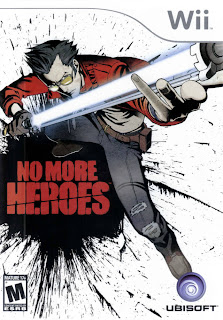
I said once,"I don't buy games that I think I won't enjoy." Now, you may ask of me immediately after seeing this box art, "So why did you buy this one and not the (much better) sequel?" Well, my dear fellows, I bought this one because it was only $12. Amazon "Deal of the Day" has been a bookmark on my browser for quite some time, you see. Still, this game has been sitting on my living room floor for many, many months, and I even beat Super Mario Galaxy 2 and Mass Effect 2 - apparently I have a thing for sequels - before I started this game. I was only mildly interested and this game has been on my back log of "games to play" ever since it came out, so I thought to myself, "Why not now?" The main reason for why not now of course would be that a recommendation declaring "you shouldn't waste your money on this not-even-worth-$12-game" seems unnecessary. But how could I have known that before I started to play?
However, I bitterly feel I must tell people to not buy this game on account of all the lists that mention this as one of the must-have Wii games. I just don't understand why. Sure, I can see this game as a fun beat'em up with classic throwbacks - which are pretty entertaining for a little while - but I refuse to accept this on any must-have list. It may say something about the system that No More Heroes makes it onto such lists, but I believe that would be judging the Wii unfairly. After all, there are several great games for the Wii which I actually would classify as must-have. No More Heroes must have cheated its way onto those lists somehow.
In the opening scenes, Travis Touchdown has just taken down the number 11 ranked assassin, which causes a sexy lady with a sexy French accent to come out and fill you in on the rest of the game's story. Here's how it goes: Travis wants to be number 1 (but maybe only for the sex) and so you have to work your way up through the list. You start the actual gameplay tossed into the middle of a fight, with an optional tutorial, against faceless thugs in the mansion of assassin number 10. If you already know how to fight, which isn't hard to figure out (A -sword, B - punch, Z - lock-on), then you can instantly progress into fighting more faceless thugs through identical corridors. I don't expect every enemy to look like a different person, but I do expect to be able to turn around and know whether or not I've been down that way. For the first time in my life, I got dizzy and disoriented playing a videogame. I played both Super Mario Galax[ies] and never felt like I should take a couple Advil. The camera itself is just terrible, but the lock-on option definitely helps. The soundtrack is appropriate to all the slaughter as well as for Travis himself. Everything about Travis Touchdown makes a strange kind of sense, which adds to the overall enjoyment, but fails to really do anything special.
The gameplay sadly has a more common feel to it. Run through a bunch of bad guys, slicing them all to bits, and then find a boss, who then gets sliced to bits. The main draw of this game I suppose, other than its unique brand of humor, is the bloody way of dispatching an enemy. For a killing blow, directional instructions will pop up and, if these are done correctly, someone gets their head chopped off or cut in half down the middle. I assume Suda51 believes toilet humor and gallons of gore make a good game, despite unresponsive controls and a pitiful job system. To be more specific, every time there was a "down" instruction for the wiimote, I missed it. All other directions worked well (most of the time), but for some reason, the down almost always failed. What's more, is that after each boss, you need to earn enough money to enter the next fight. This is done by driving a motorcycle through Santa Destroy to various jobs. Whether its collecting coconuts or killing as many of those faceless thugs as possible, the jobs are boring and uninspired. The worst parts of this game all involve driving around to collect more money. It's just a time waster to make the game longer without any actual fun provided.
Overall, I may be being too harsh, but I was looking forward to this game because of all the lists telling me to buy it and No More Heroes was a disappointment. The gameplay was regular and unimpressive while the story itself was bland. Get to number 1. The end. Suda51 did what it could to make this game enjoyable and the boss fights were where the originality and creativity really stand out, but those are such a small part of this game that I can't overlook all the traveling around Santa Destroy - about half an hour each time - and the boring battles from the start of the mission to the boss fight - about another thirty minutes. There was nothing that was excessively bad other than the camera and there was nothing exceptionally good other than the boss fights. That means this game falls in the middle area of scoring, but when taking into account all the must-have talk, it drops down another half point.
2.5/5 Slightly Worse Than Average! Almost Mediocre!






